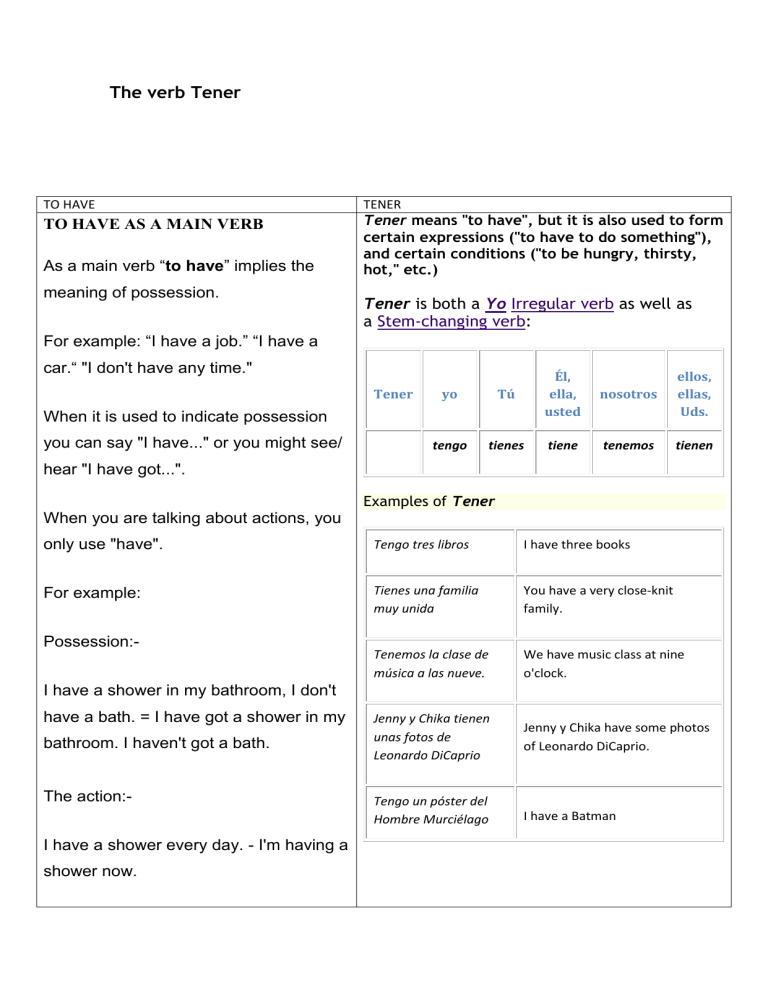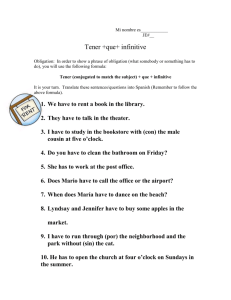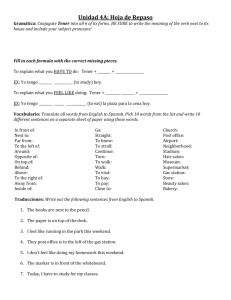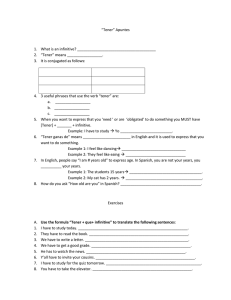
The verb Tener TO HAVE TO HAVE AS A MAIN VERB As a main verb “to have” implies the meaning of possession. TENER Tener means "to have", but it is also used to form certain expressions ("to have to do something"), and certain conditions ("to be hungry, thirsty, hot," etc.) Tener is both a Yo Irregular verb as well as a Stem-changing verb: For example: “I have a job.” “I have a car.“ "I don't have any time." Tener yo Tú Él, ella, usted tengo tienes tiene When it is used to indicate possession you can say "I have..." or you might see/ nosotros ellos, ellas, Uds. tenemos tienen hear "I have got...". Examples of Tener When you are talking about actions, you only use "have". Tengo tres libros I have three books For example: Tienes una familia muy unida You have a very close-knit family. Tenemos la clase de música a las nueve. We have music class at nine o'clock. Jenny y Chika tienen unas fotos de Leonardo DiCaprio Jenny y Chika have some photos of Leonardo DiCaprio. Tengo un póster del Hombre Murciélago I have a Batman Possession:I have a shower in my bathroom, I don't have a bath. = I have got a shower in my bathroom. I haven't got a bath. The action:I have a shower every day. - I'm having a shower now. Note - it does not take the continuous form "I having" - for that you have to use the auxiliary verb be. poster. For example: “I am having a shower.” “Are you having a good time?" The forms of the verb “to have” are have and has for the present and had for the past. Tener expressions In English we say that we are hungry or we are hot, using a form of "to Be". In Spanish, if you used a form of Ser with one of these descriptions, you would be saying something entirely different. For example, to say "I am hot", we use Tener [not Ser ] : Tengo calor[literally, "I have heat"] The verb “to have” is used as an If you made the mistake of saying *Yo soy calor , you would be saying something like, "I am the incarnation of the abstract concept of Heat." This is probably not what you intended to say unless you were in a play involving the elements. So review the Tener phrases and practice them until it seems natural to say them. auxiliary verb to help other verbs create Common Tener expressions include: Examples TO HAVE AS AN AUXILIARY VERB the perfect tense - auxiliary verb have [+ past participle]. Tener calor to be hot For example, “I have read a lot of Tener cuidado to be careful Tener éxito to be successful Tener frío to be cold Tener ganas de to feel like..., to have the desire to... Tener hambre to be hungry books,” or “I have never been to America,” or "I have already eaten." THE USE OF HAVE TO In addition to the two forms, there is another use for have as a modal verb; have to or have got to. This, of course, must be followed by another verb "We have to do something". TO HAVE SOMETHING DONE If something is done for you, in other Tener interés to be interested Tener miedo to be afraid Tener sed to be thirsty Tener sueño to be sleepy Tener prisa to be in a hurry Tener razón to be right (correct) No tener razón to be wrong words you haven't actually done it yourself, we use the structure "to have something done". For example:"I have my hair cut once every six weeks." (I don't cut my own hair, my hairdresser cuts it for me.) Another way we use Tener is to express that we "have to" do something. The expression is constructed with Tener + que + infinitive: Tengo que estudiar esta mañana I have to study this morning. Tienes que practicar tenis hoy You have to practice tenis today. Tenemos que hablar con la profesora We have to speak with the professor. Tienen que ir al hospital They have to go to the hospital. Ustedes tienen que leer el drama You (all) have to read the play. We also use Tener to express that we "really feel like" doing something or have the desire to do something. The expression is constructed with Tener ganas + de + infinitive: Tengo ganas de estudiar esta mañana. I seriously have a passion to study this morning. Tienes ganas de jugar al tenis hoy. You really want to play tenis today. Tenemos ganas de bailar. We really feel like dancing. Tienen ganas de ir al hospital para visitar a su primo. They really want to go to the hospital to visit their cousin. Ustedes tienen ganas de asistir al drama. You all really have a desire to attend this play. And of course, we use Tener to express age: Tengo veintiún años I'm twenty-one (years old). Tiene quince años He's fifteen (years old). Nosotros dos tenemos veinticinco años We're both twenty five years old.



